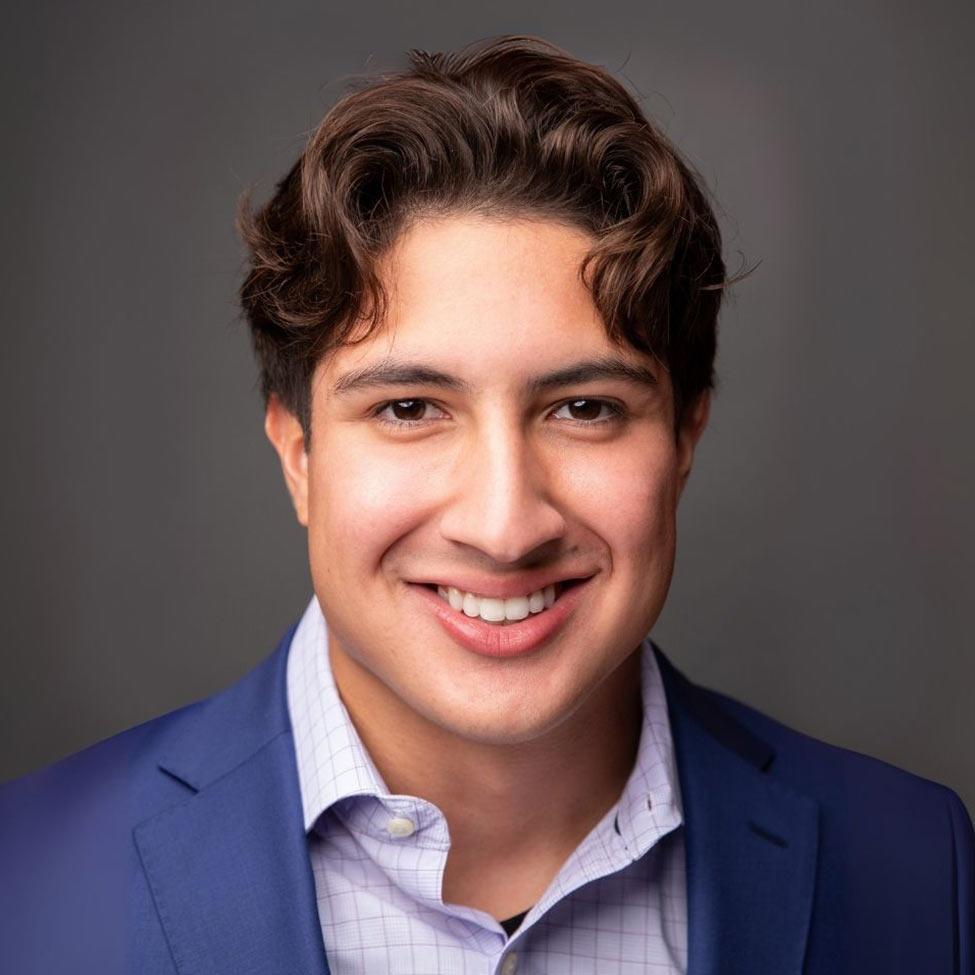
NY Law Schools See New Interest in Immigration Classes, Clinics
In Bloomberg Law, Haub Law Professor Amelia Wilson, Director of the Immigration Justice Clinic, noted a surge in student interest in immigration law amid rapidly changing federal policy. For Fall 2025, the clinic received more applications than it could accommodate, following a fully enrolled Spring semester. Wilson added that many students have even offered to volunteer informally while awaiting a spot—reflecting a growing recognition that immigrant rights are central to broader civil and human rights work.
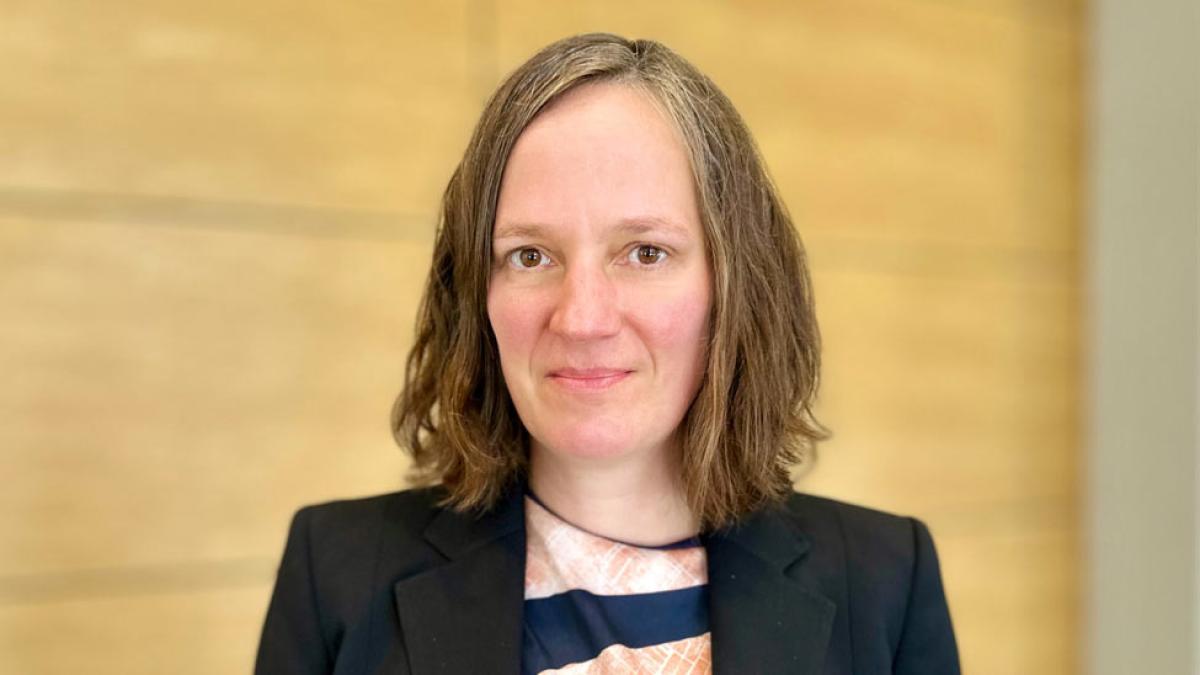
The Fatal Attraction Murder
Haub Law Professor Bennett Gershman appeared in The Fatal Attraction Murder, a limited series re-airing on Oxygen. In the episode—originally aired in 2022—Professor Gershman reflected on the 1989 murder of Betty Jeanne Solomon in Scarsdale, noting how the drawn-out investigation stirred anxiety in the Westchester community.
Deepfaked After Death: Some Don't Want It
Manager Of Content and Digital Engagement Johnni Medina was featured in Axios discussing the ethical risks of AI deepfakes used after death. “For me, it’s a consent issue,” they said, cautioning that digital avatars can distort a person’s legacy— especially when used to weigh in on contentious issues like the death penalty.
Student Leaders at the Forefront: Higher Education’s Role in Advancing Global Goals
At a United Nations forum on higher education and the Sustainable Development Goals, Assistant Provost for Wellness Sue Maxam announced the launch of MCN’s new Civic Learning Council. The Council will advise hundreds of campuses participating in the Millennium Fellowship, sharing best practices to strengthen civic engagement.
Pace University Lifeguards Honored with American Red Cross Lifesaving Award for Heroic Rescue
Pace students Kieran Hagan and Angelo DeAugustino were spotlighted by the American Red Cross for saving a life at the Pleasantville pool. Within 45 seconds, they activated the Emergency Action Plan—performing CPR and using an AED. Their instructor, Kate Palladino, was also recognized for preparing them to respond.
Bringing Pace Research to Global Audiences: Seidenberg Professor and Students Present at Two International Conferences
Mary Tedeschi, professor at Pace University’s Seidenberg School, spent much of 2025 doing what she does best: teaching her students and guiding them through research to such a level that they presented their papers at two prestigious international virtual education conferences.
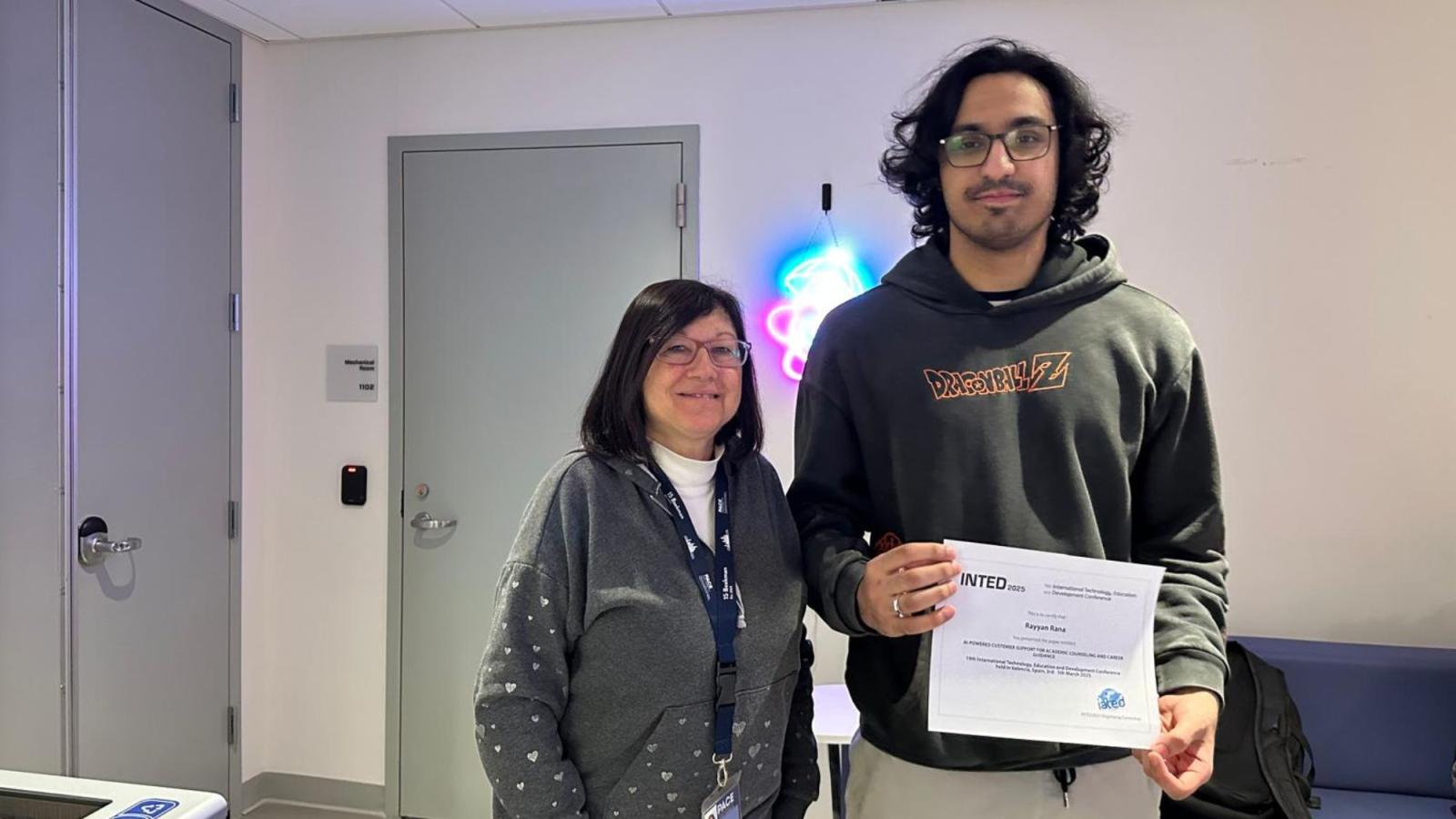
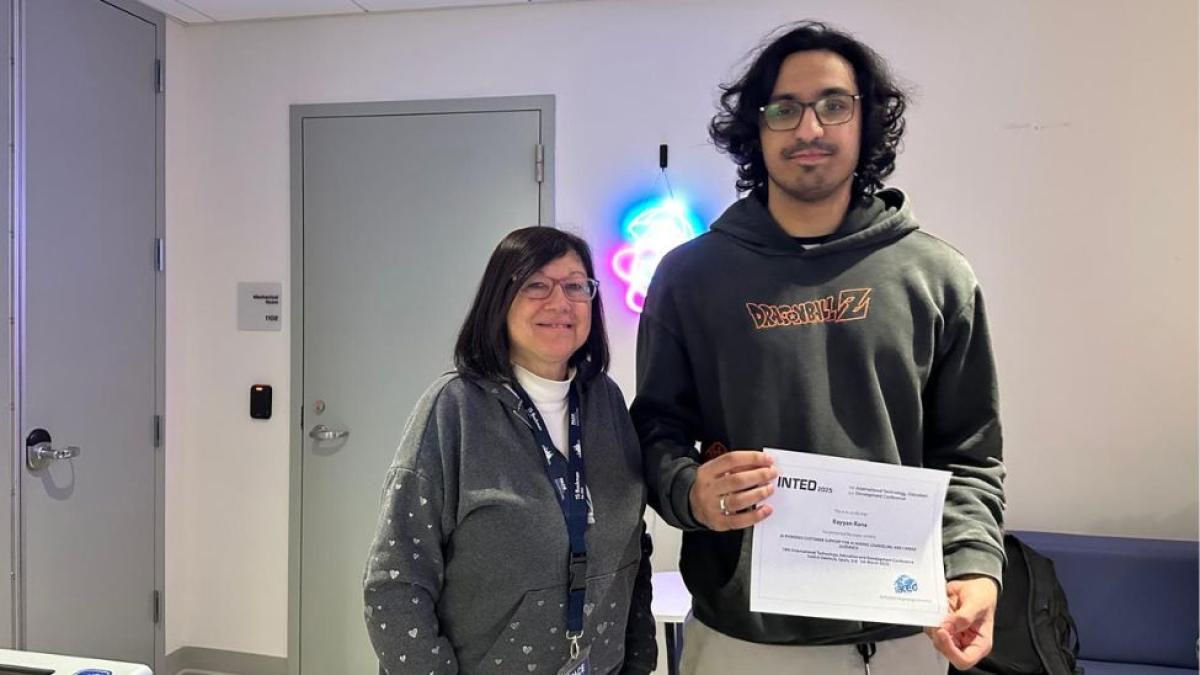
Mary Tedeschi, professor at Pace University’s Seidenberg School of Computer Science and Information Systems, spent much of 2025 doing what she does best: teaching her students and guiding them through research to such a level that they presented their papers at two prestigious international virtual education conferences: INTED 2025 based in Valencia, Spain and EDULEARN 2025 in Palma, Spain.
Working alongside both undergraduate and graduate Pace students, and in collaboration with peers from NYU and City Tech CUNY, Professor Tedeschi's research bridged technical innovation, pedagogical advancement, and human-centered design. These projects, which explore everything from artificial intelligence in student advising to foundational programming patterns, demonstrate the real-world impact of student-faculty research partnerships that is so central to the Pace experience.
It’s a pleasure to work with eager, motivated students!
INTED 2025: From Code to Classroom Impact
At INTED (International Technology, Education and Development Conference) 2025, an annual conference spotlighting innovation and technology in education, Professor Tedeschi and her team of students from Pace and City Tech CUNY presented two projects.
The first paper, Teaching the Iterator Pattern in Introductory Programming Courses, tackled the issue of introductory programming courses often struggling to bridge theory and practice. In response, this study focused on introducing the iterator pattern (a behavioral design pattern) early in the curriculum to build students' foundational programming skills in languages like Python and Java.
The research leveraged a combination of visual tools, hands-on-practice, pair programming, alternative teaching approaches, and peer collaboration, all reinforced through assessments and reflective writing. Results showed improvement in student comprehension, with the students expressing appreciation for the hands-on approach and finding it a more engaging learning environment.
The project also gave graduate students a unique opportunity to deepen their own understanding by contributing to the curriculum used to teach undergraduates at different institutions, further bridging theory and practice for the researching students as well.
For their second INTED presentation, AI-Powered Customer Support for Academic Counseling and Career Guidance, Professor Tedeschi and her students explored how AI tools are reshaping academic and career advising. The study assessed how systems like IBM Watson Education and AI-powered chatbots can provide scalable, personalized, ethical, and around-the-clock guidance to students, which would be especially helpful in large educational institutions where counselor-to-student ratios are imbalanced (they can be as high as 1 counselor per 500 students in some cases).
Using natural language processing (NLP) and predictive analytics, these tools can help students track progress, receive course recommendations, and prepare for internships and careers. However, the research also outlined key ethical challenges: mitigating algorithmic bias, ensuring data privacy, and balancing AI efficiency with human empathy.
The team concluded that hybrid models in which human advisors use AI to their benefit may be the most ethical and effective path forward.
EDULEARN 2025: Simplifying Data, Amplifying Access
At EDULEARN (International Conference on Education and New Learning Technologies) 2025, Professor Tedeschi and her students unveiled a technical, future-facing project: the development of an AI-driven database system designed to make data management accessible to non-technical users.
The paper, An Advanced AI-Driven Database System, outlined a platform that uses large language models (LLMs) like GPT-4 and reinforcement learning to automate core database functions, ranging from schema generation to natural language querying and backend optimization.
The team, a collaboration of students from both Pace and NYU, built a modular architecture that supports multiple database types (e.g., SQL, NoSQL, vector, graph) and employs AI to automatically detect data types, translate user queries, and adjust performance. In testing, the system responded to user questions in plain language, improved speed and accuracy, and adapted automatically to changing needs. The project illustrates how AI can simplify complex data tasks while also raising important conversations about ethics, particularly around accuracy, transparency, and data privacy.
Collaboration and Global Exposure
From building smarter database tools to reimagining student support systems, the work of Professor Tedeschi and her team highlights how deeply involved Pace students are at every stage of their research projects. “They did an outstanding job and even completed extra work,” she said. “Students are already asking me to be a part of future research and conference experiences.” With faculty mentorship and collaboration across New York City institutions, our students gain real-world experience as they shape research, guide implementation, and present their findings on the global stage.
Sara Gonzalez-Rothi, Former White House Senior Director for Water, Joins Pace Haub Law as Visiting Assistant Professor of Environmental Law
The Elisabeth Haub School of Law at Pace University is pleased to announce that Sara Gonzalez-Rothi will join its faculty as a Visiting Assistant Professor of Environmental Law. Prior to joining the Haub Law faculty in 2025, Professor Gonzalez-Rothi served in a variety of roles within the United States Senate and the Executive Office of the President. Most recently, she served as the Senior Director for Water at the White House Council on Environmental Quality. During her time at Pace Haub Law, Professor Gonzalez-Rothi will be teaching Administrative Law and Water Law.
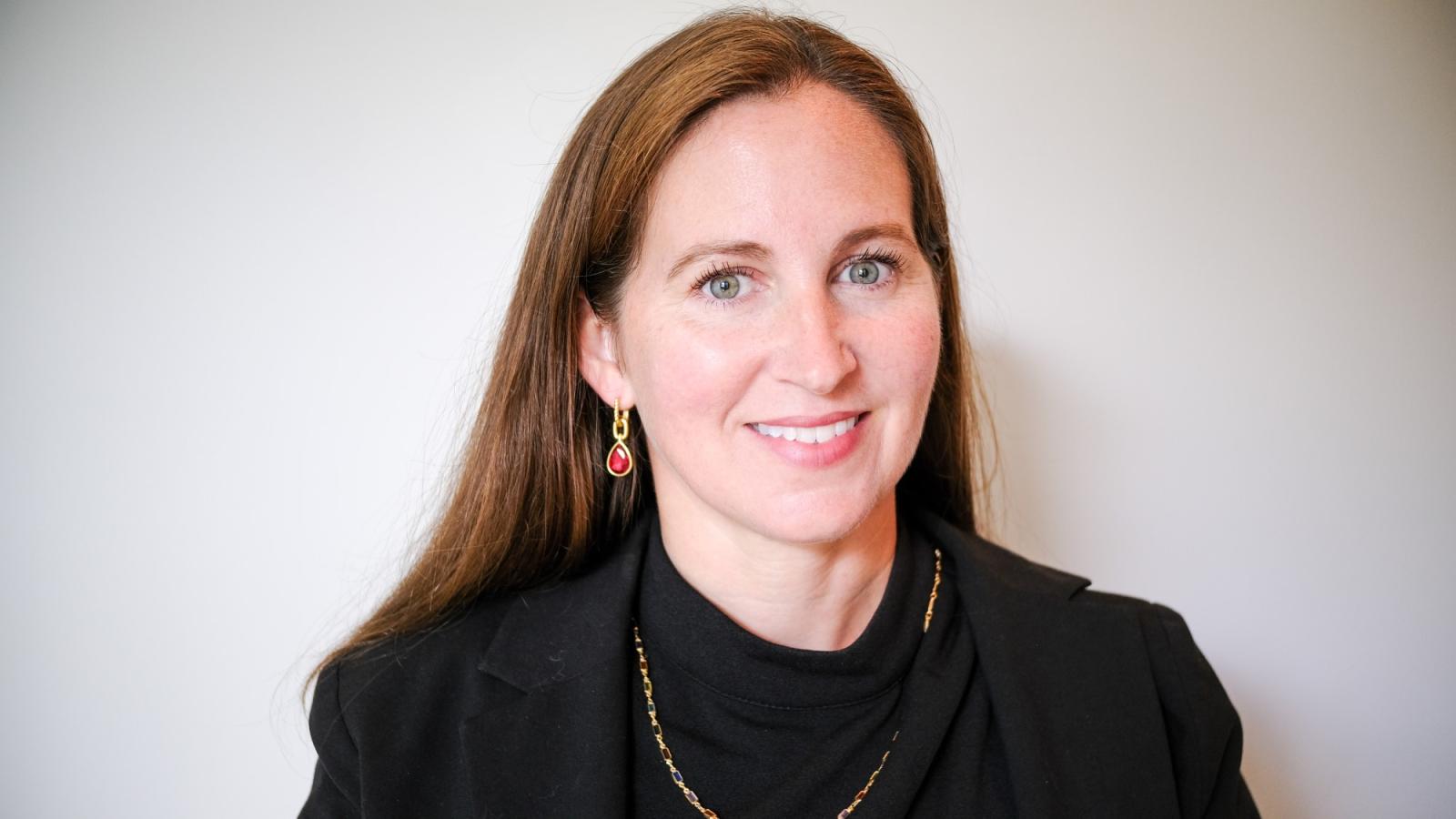
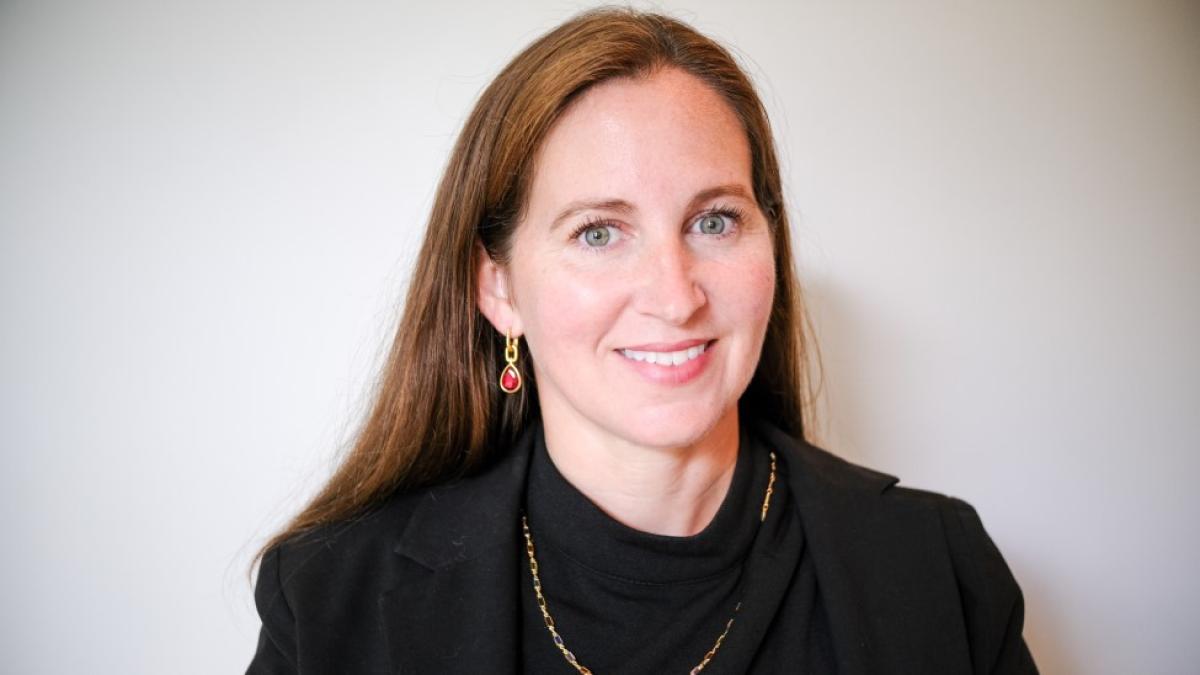
The Elisabeth Haub School of Law at Pace University is pleased to announce that Sara Gonzalez-Rothi will join its faculty as a Visiting Assistant Professor of Environmental Law. Prior to joining the Haub Law faculty in 2025, Professor Gonzalez-Rothi served in a variety of roles within the United States Senate and the Executive Office of the President. Most recently, she served as the Senior Director for Water at the White House Council on Environmental Quality. During her time at Pace Haub Law, Professor Gonzalez-Rothi will be teaching Administrative Law and Water Law.
"At this critical moment for the rule of law and the right of every person to clean air, clean water, and a safe and healthy environment, I am humbled and excited to join the exceptional team of faculty and students at Pace Haub Law," said Professor Gonzalez-Rothi. "Brave and skilled lawyers of tomorrow hold the keys to unlock a more just future, and we are fortunate to participate in their development."
From 2021–2025, Professor Gonzalez-Rothi served as the Senior Director for Water at the White House Council on Environmental Quality. She was in this role for the entire duration of the Biden-Harris Administration and was responsible for coordination and harmonization of federal interagency activities related to marine, freshwater, and drinking water policy. Prior to this, she served as Senior Counsel to the U.S. Senate Committee on Commerce, Science, and Transportation, where she advised all democratic members of the Committee on issues related to the ocean and atmosphere. Professor Gonzalez-Rothi also held other positions, including as a Senior Policy Specialist with the National Wildlife Federation and as Legislative Counsel to a U.S. Senator, where she advised on issues related to environment, energy, agriculture, and animal welfare.
“Professor Gonzalez-Rothi comes to the Elisabeth Haub School of Law at Pace University with over sixteen years of experience related to complex environmental policy matters,” said Achinthi Vithanage, Executive Director of the Environmental Law Program and a Professor of Law for Designated Service in Environmental Law at the Elisabeth Haub School of Law at Pace University. “She has dedicated her career to public service and advancing commonsense solutions to bettering the environment. The entire Pace Haub Law community will benefit from the unique perspective that Professor Gonzalez-Rothi will bring to our environmental law program and larger campus community.”
During her time working in the White House Council on Environmental Quality, Professor Gonzalez-Rothi had several impressive accomplishments. She established and co-led the Ocean Policy Committee, which was co-chaired by the White House Office of Science and Technology Policy. Under this leadership, the Ocean Policy Committee developed the first ever United States Ocean Climate Action Plan (PDF), Ocean Justice Strategy (PDF), and National Strategy for a Sustainable Ocean Economy (PDF). She also helped establish and run the first ever Interagency Policy Committee on Poly- and Per-Fluoroalkyl Substances (PFAS). Additionally, she created the America the Beautiful Freshwater Challenge Initiative, launching the Wetland and Water Resource Protection Guide, and hosting the White House Freshwater Summit. Notably, she also helped to forge two historic agreements to pause longstanding litigation against the federal government by Tribal Nations, states, and environmental organizations regarding the degradation of salmon and other native fish in the Columbia River Basin. While working in the United States Senate, she played a large role in negotiating and successfully shepherding the RESTORE Act through Senate passage with overwhelming bipartisan support and ultimately to a final enactment.
Professor Gonzalez-Rothi is a frequently sought after independent consultant and has conducted legal and policy research and writing, briefed congressional staff, provided strategic counsel, served as a guest lecturer, and more on high-impact environmental and science policy matters. Her research interests and scholarship include climate change, water law, pragmatic environmentalism, and more. Her most recent publication includes Cultivating Fair Winds and a Following Sea: Considerations for Offshore Wind Proponents in New York, published in The New York Environmental Lawyer. Professor Gonzalez-Rothi is a Board Member with the Coastal States Stewardship Foundation and previously served as an Advisory Board Member with the Women’s Aquatic Network and an Appointed Member with the Maryland State Parks Advisory Commission. She graduated with a BA from the University of Florida and a JD (cum laude) from the University of Miami School of Law.
2025 Elisabeth Haub Award for Environmental Law and Diplomacy to Honor Former UN Special Rapporteurs John Knox and David Boyd for Pioneering Work Recognizing the Right to a Healthy Environment
The Elisabeth Haub School of Law at Pace University is proud to announce that the 2025 Elisabeth Haub Award for Environmental Law and Diplomacy will be jointly awarded to Professor John H. Knox and Dr. David R. Boyd for their groundbreaking efforts as successive United Nations Special Rapporteurs on the human right to a healthy environment. The award will be presented during a ceremony at Pace University in New York City on October 23, 2025.
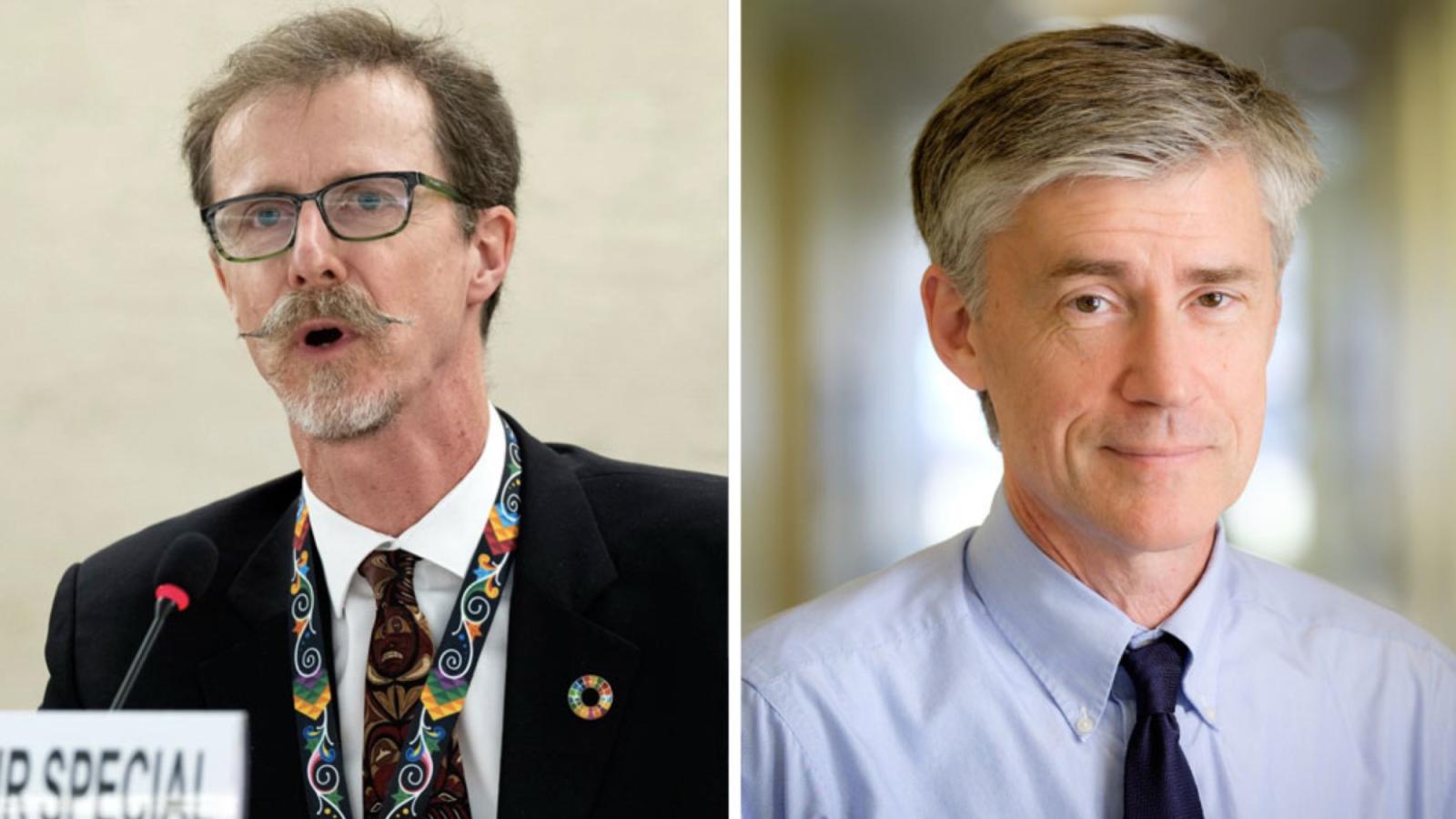
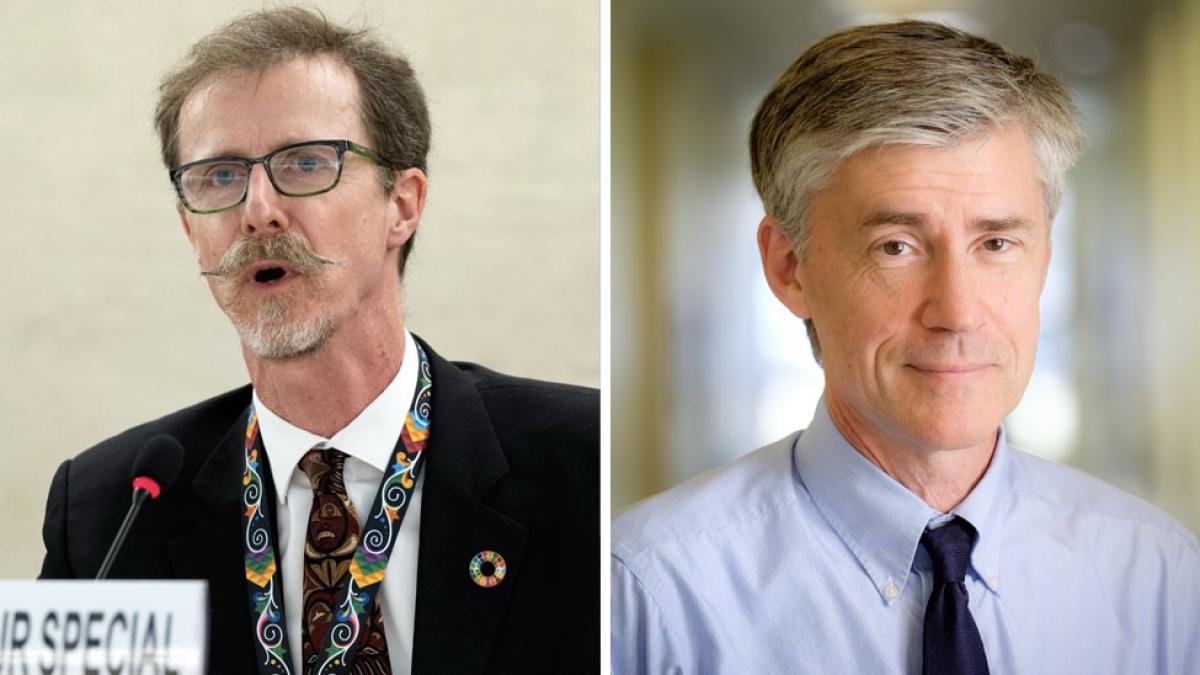
The Elisabeth Haub School of Law at Pace University is proud to announce that the 2025 Elisabeth Haub Award for Environmental Law and Diplomacy will be jointly awarded to Professor John H. Knox and Dr. David R. Boyd for their groundbreaking efforts as successive United Nations Special Rapporteurs on the human right to a healthy environment. The award will be presented during a ceremony at Pace University in New York City on October 23, 2025.
Together, Professors Knox and Boyd have profoundly shaped the field of international environmental law by laying the foundation for the recognition of the human right to a clean, healthy, and sustainable environment. Their work as Special Rapporteurs—Knox from 2012 to 2018 and Boyd from 2018 to 2024—has been instrumental in inspiring legislative, diplomatic, and judicial support for environmental rights around the globe. Their achievements were bolstered by the recent landmark ruling by the International Court of Justice (ICJ), which affirmed the right to a healthy environment as a binding norm of international law.
For decades, the right to a healthy environment was absent from foundational human rights documents, including the Universal Declaration of Human Rights which was adopted in 1948. Despite growing awareness following the environmental movements of the 1970s, efforts to enshrine environmental rights at the United Nations met repeated resistance, even as over 150 countries adopted such protections domestically or regionally. It wasn’t until 2012 that real momentum began, when the UN Human Rights Council appointed Professor John Knox as the first Independent Expert on human rights and the environment. Knox spent six years building the legal foundation for environmental human rights, culminating in the Framework Principles on Human Rights and the Environment, a landmark set of guidelines that clarify how existing human rights obligations relate to the protection of the environment. His successor, Dr. David Boyd, expanded on that legacy, leading a global coalition of governments, UN agencies, and over 1,300 civil society organizations to champion recognition. Together, Knox and Boyd steered a decades-stalled conversation toward success, culminating in the landmark resolutions of the UN Human Rights Council (2021) and UN General Assembly (2022) recognizing the human right to a clean, healthy and sustainable environment. Their shared journey—rooted in scholarship, diplomacy, and advocacy—transformed a long-ignored principle into a universal standard for environmental justice.
John Knox and David Boyd are visionary leaders who laid the legal and moral groundwork for one of the most consequential developments in international environmental law: global recognition of the human right to a healthy environment.
“John Knox and David Boyd are visionary leaders who laid the legal and moral groundwork for one of the most consequential developments in international environmental law: global recognition of the human right to a healthy environment,” said Horace E. Anderson Jr., Dean of the Elisabeth Haub School of Law and President of the Haub Award Jury. “Their scholarly rigor, institutional leadership, and global advocacy have advanced a transformative agenda that now defines the next chapter of environmental justice.”
John H. Knox, the Henry C. Lauerman Professor of International Law at Wake Forest University, served as the first UN Independent Expert—and later the first Special Rapporteur—on human rights and the environment. His mandate focused on clarifying the human rights obligations of States in relation to environmental protection. Professor Knox consulted with hundreds of stakeholders worldwide, visited more than 25 countries, and authored over 30 reports. In 2018, he presented the Framework Principles. Professor Knox has long urged the integration of human rights principles into climate protection and biodiversity conservation and has been a leading voice on the promotion and protection of the rights of environmental defenders and Indigenous Peoples.
Dr. David R. Boyd, professor at the University of British Columbia, succeeded Knox as UN Special Rapporteur. In his role, Boyd worked with governments, courts, and communities to operationalize the right to a healthy environment. He submitted amicus briefs in 15 landmark legal proceedings, delivered over 500 speeches globally, and produced more than 30 UN reports that further defined the legal contours of environmental rights. His efforts have been cited by the International Court of Justice, the Inter-American Court of Human Rights, and the European Court of Human Rights. Beyond his UN work, Dr. Boyd is the author of ten books and over 100 publications on environmental topics and has advised governments across the globe on environmental and constitutional law.
The lifelong commitment of Knox and Boyd to advancing environmental law and human rights has had lasting impacts at every level—from international legal frameworks to community-level empowerment. The ICJ’s recent opinion reaffirms and elevates this right as a cornerstone of international human rights law.
“Professors Knox and Boyd exemplify the values of courage, advocacy, and collaboration that the Haub Award seeks to honor,” said Liliane Haub, environmental advocate, Pace University Trustee, and member of the Haub Award Jury. “Their tireless efforts have not only expanded the frontiers of environmental law but also safeguarded dignity and justice for present and future generations.”
The Elisabeth Haub Award for Environmental Law and Diplomacy is the world’s most prestigious award in the field of environmental law. The Award has a distinguished history since 1979 shaped by progress in the field of environmental law and policy, and through collaborations with the Université libre de Bruxelles and the International Council of Environmental Law. In 2016, the family of Elisabeth Haub and the Elisabeth Haub School of Law at Pace University established the award as it is known today to honor Elisabeth Haub (1899–1977), a noted philanthropist and advocate for strong laws for the conservation of nature. Chosen annually by an esteemed jury, the Award recognizes the innovation, skill, and accomplishments of lawyers, diplomats, international civil servants and other advocates who work to create the world environmental order. In 2024, the Haub Award was presented to Singapore Ambassador Rena Lee and Kristina Maria Gjerde in recognition of their landmark achievements to protect biodiversity in the high seas through the United Nations Agreement on Biodiversity Beyond National Jurisdiction (BBNJ).
The ceremony for the 2025 Elisabeth Haub Award for Environmental Law and Diplomacy honoring Professor John Knox and Dr. David Boyd and will take place on Thursday, October 23 at 5:00 p.m. EST in New York City and be broadcast virtually.
Breaking Into Private Equity
From deal analysis to networking, Christian Valerio ’27 dives into private equity at Court Square, shaping his path in finance.
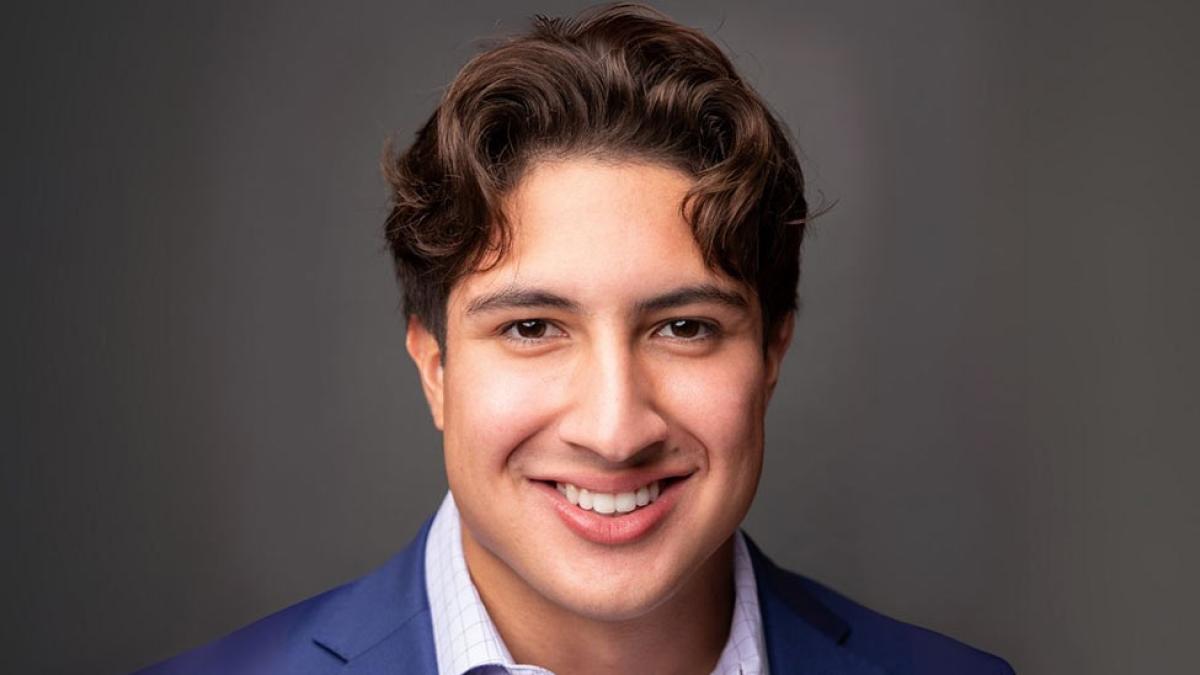
Christian Valerio
Class of 2027
Currently Studying: BBA in Finance and Minor in Accounting
Current Internship Position: Private Equity Intern
Company: Court Square Capital Partners

How has the Lubin School of Business helped you prepare for your current internship?
The Lubin School of Business has played a key role in preparing me for my internship. Through Career Services—and especially with help from James Davis—I received valuable support with résumé development and participated in mock interviews, which enhanced my confidence and readiness for the interview process. Additionally, staying informed on financial news was strongly encouraged, helping me remain engaged with current market trends. Academically, courses such as financial accounting, managerial accounting, and financial management provided me with a solid foundation of knowledge that I was able to apply directly to my day-to-day responsibilities during the internship.
What attracted you to this internship?
What attracted me to this internship was my strong interest in finance and my desire to explore both the finance and accounting industries, given my major and minor. I have always been particularly drawn to private equity—especially the opportunity to be on the buy-side, support company growth, and help drive a profitable exit. Court Square Capital stood out to me not only because of its long-standing reputation as one of the first private equity firms, established in 1979, but also because of its consistent track record of success. I saw this internship as a valuable opportunity to gain hands-on experience and understand how a leading firm like Court Square operates.
Describe what a typical day look like for you in this role.
A typical day in this role changes week to week, as the internship is part of a six-week rotational program. So far, I’ve worked with the deal team, assisted with Investor Relations (IR), participated in onboarding training, and contributed to a case study project that will culminate in a presentation to the investor committee, where I’ll pitch an investment opportunity.
My day typically begins around 9:00 a.m., when I arrive at the office and greet colleagues, including fellow intern Paolo Bayle, who is also a student at Pace University. I then log in, check my email, and review my team’s calendar to confirm the day’s meetings and priorities. I also start the morning by reading The Financial Times and The Wall Street Journal to stay current on financial and market developments.
Currently, my primary focus is the case study project. I began by creating a heads-up memo (HUM) and am now building a comprehensive investor committee deck. In the early stages, I analyzed the company’s Confidential Information Memorandum (CIM) and reviewed a market study to identify industry trends, growth drivers, and risks. I continue to reference both as I refine the investment thesis and presentation. To support my analysis, I’ve used platforms such as Preqin, PitchBook, and S&P Capital IQ to gather comparable company data, industry benchmarks, and transaction comparisons.
I often end my day connecting with team members across the firm to learn more about their roles, career paths, and perspectives on the industry. Conversations with associates who recently transitioned from investment banking to private equity have been especially valuable, offering insight into changes in work dynamics and long-term growth opportunities in the PE space.
Overall, my days combine research, technical analysis, strategic thinking, and relationship-building across multiple functions of the firm.
What has been the highlight or most enjoyable aspect of your internship so far?
The most enjoyable aspect of my internship has been getting to know the people at Court Square. As a smaller firm, it has offered a unique opportunity to connect closely with associates, principals, vice presidents, partners, and even co-founders. Hearing about their career journeys and how they broke into finance and ultimately joined Court Square has been incredibly insightful and motivating. I have especially enjoyed speaking with the co-founders to learn how the private equity landscape has evolved over the past 40 years and how Court Square has maintained its strong reputation and track record of success. The firm’s inclusive and welcoming culture has made this experience especially meaningful, and the chance to build relationships and learn from such experienced professionals has been the highlight of my internship.
How has this experience shaped or impacted you career goals?
This experience has had a significant impact on my career goals by providing a hands-on perspective on the private equity industry. Working at Court Square allowed me to see firsthand how a successful middle-market private equity firm operates—from deal structuring to internal collaboration—and gave me insight into the firm’s strong culture and work-life balance. It has deepened my interest in finance and affirmed my desire to pursue a career in the field. Seeing how Court Square has remained consistent and successful over decades has been both inspiring and informative, and it has motivated me to continue exploring opportunities within private equity and broader financial services.
How do you plan to apply what you’ve learned during this internship to your next semester at Lubin?
I plan to apply the skills and insights gained from this internship directly to my upcoming semester at Lubin. The Excel proficiency and financial modeling techniques I developed—particularly around LBO modeling and P&L analysis—will be highly valuable for my finance and accounting coursework. Additionally, the industry insights and strategic thinking I have gained from working on live deals and interacting with professionals across the firm will help me approach class projects with a more practical, real-world perspective. This experience has strengthened my analytical skills and deepened my understanding of financial markets, which I plan to leverage in both my academic work and future career planning.
The industry insights and strategic thinking I have gained from working on live deals and interacting with professionals across the firm will help me approach class projects with a more practical, real-world perspective.
Do you have any advice for other Lubin students who are looking to pursue internships in the future?
My advice to other Lubin students is to be proactive, persistent, and open to building connections. Take full advantage of the resources Pace offers—especially Career Services. They have a deep understanding of the industry and can provide valuable support with résumé building, mock interviews, and overall preparation for the roles you are targeting.
Start by building a strong relationship with Career Services early on, and do not hesitate to reach out to alumni or professionals for coffee chats. These conversations can give you deeper insights into the industry and help clarify your interests. When interviewing, always do your research—understand the company’s background, recent deals, and the person you’ll be speaking with. Demonstrating this level of preparation shows initiative and genuine interest.
Ultimately, being ambitious, expanding your network, and maintaining a strong desire to learn will make you a more competitive candidate for any internship or future role you pursue.
Connect with Christian Online:
Fighting for Environmental Justice: Q+A with Michi Yoshikawa '25
For Michi Yoshikawa ’25, the MS in Environmental Science and Policy program has been the perfect place to explore the connection between policy, advocacy, and real-world change.
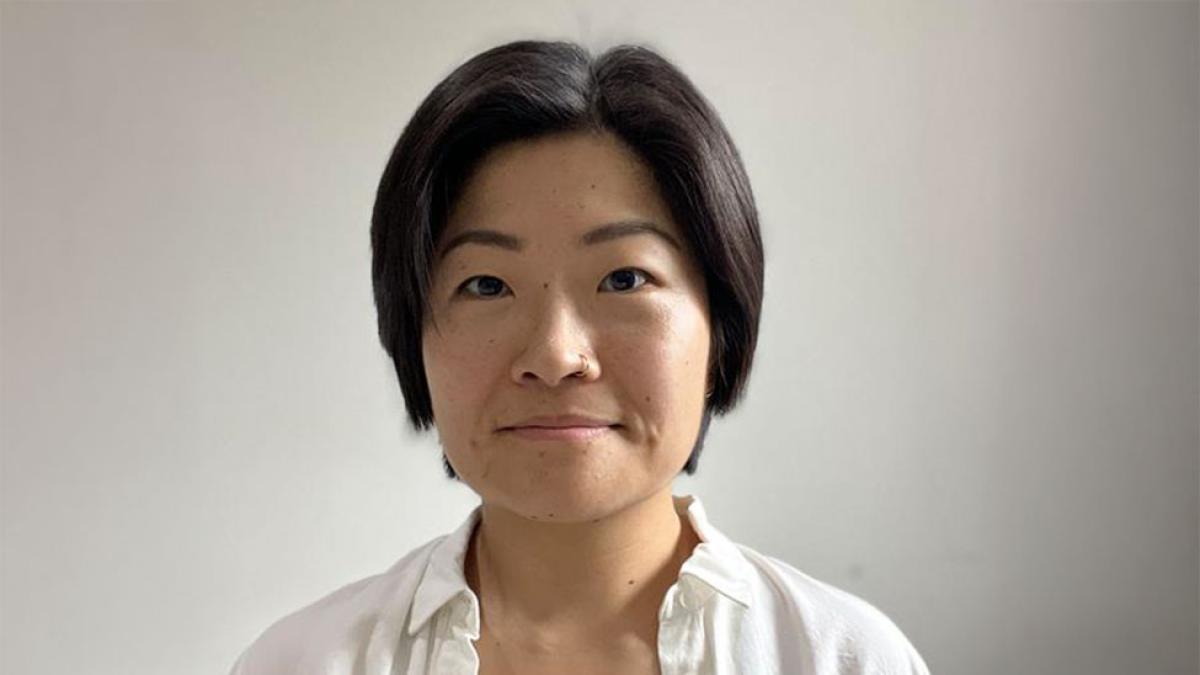
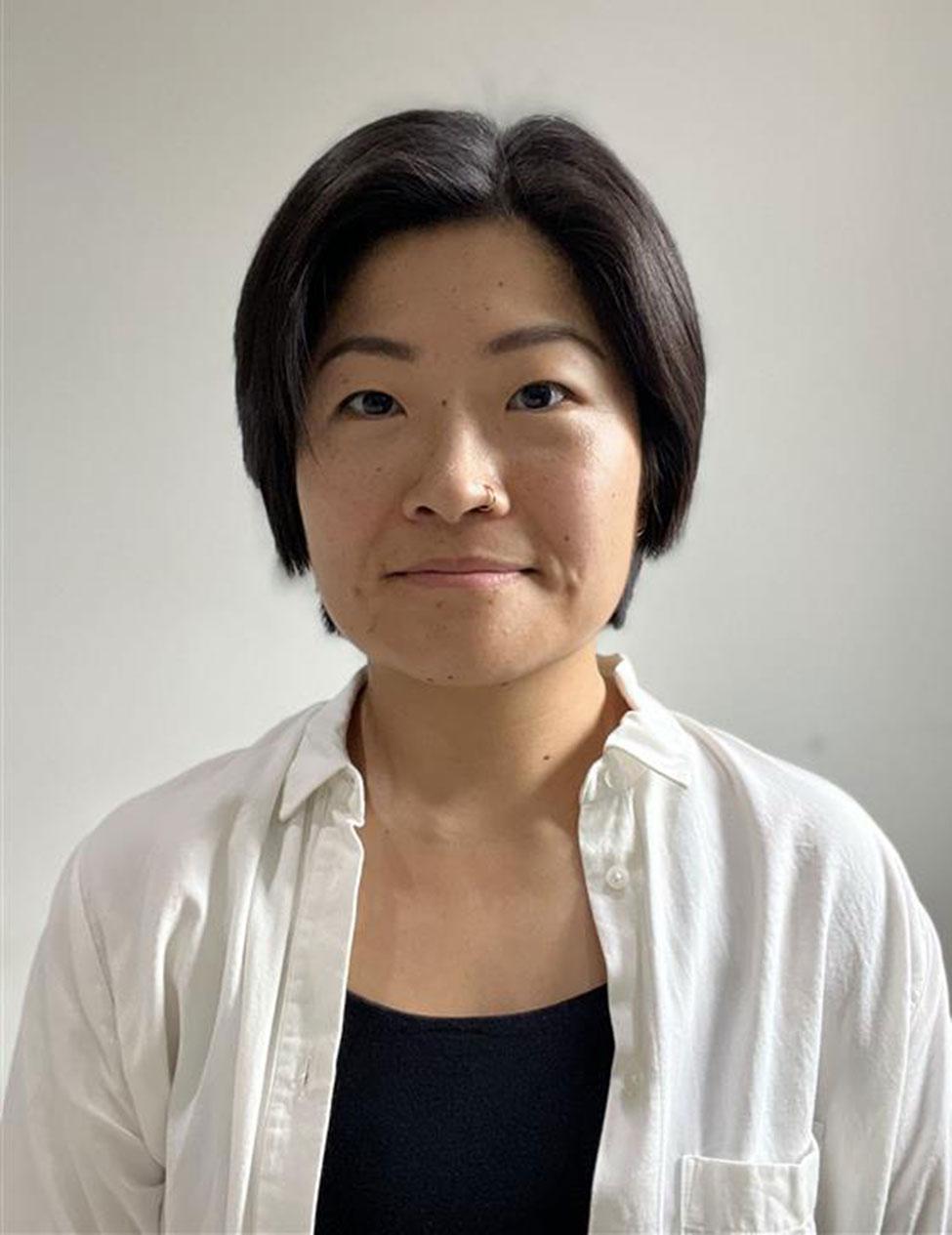
Michi Yoshikawa
Class of 2025
MS in Environmental Science and Policy
Why did you choose to pursue environmental science and policy as a course of study?
I became interested in environmental science and policy while I learned more about climate change. As I engaged in climate action, I realized that a lot of the bigger changes we need to see to mitigate climate change need to come from policy change. And since environmental justice needs to occur hand in hand with climate action, I wanted to study these topics more.
Why did you choose to enroll in the MS in Environmental Science and Policy at Pace?
After completing my undergraduate degree in veterinary medicine in Japan, I increasingly became more interested in environmental issues and wanted to pursue a master’s degree in this field. Geographically, my focus was in and around New York City, as my family lives here, and when looking into graduate programs, Pace's MS in Environmental Science and Policy was most aligned with my interests. Once here, I had great classmates who supported each other.
What have your experiences been like with the Environmental Studies and Science department? What faculty have been instrumental in your academic journey?
I've really enjoyed my time at Pace and have found that most of the classes I've taken have been challenging and eye-opening in many ways. I especially found the environmental law survey and environmental justice classes taken at Pace’s Haub School of Law very interesting, in addition to my contemporary issues class, as we were able to hear from alumni from our program and learn about different career trajectories.
When looking into graduate programs, Pace's MS in Environmental Science and Policy was most aligned with my interests, and once here, I had great classmates who supported each other.
Professor Michelle Land, JD, in the Environmental Studies and Science department has really gone above and beyond as an educator. One of my favorite classes was the environmental policy class I took with her in my first semester. I liked the way she structured the class and the feedback she gave throughout the semester was very valuable. She is so passionate about what she does and deeply cares about her students.
What research have you engaged in as part of your studies that was meaningful to you?
I'm passionate about environmental and nuclear justice and am currently writing my thesis about how these two issues overlap. Professor Melanie Dupuis, PhD, my thesis advisor, has been supportive of this somewhat niche topic from the start, and has helped me through all the unexpected twists and turns that my project took.
What are your career goals?
I would love to do something that relates to environmental justice and communication. With the current state of the world, I'm not sure how that will look yet, but I'm excited to apply what I've learned and collaborate with others in whatever way that turns out to be. This program has equipped me with the knowledge and tools I need to start my career in the environmental field.